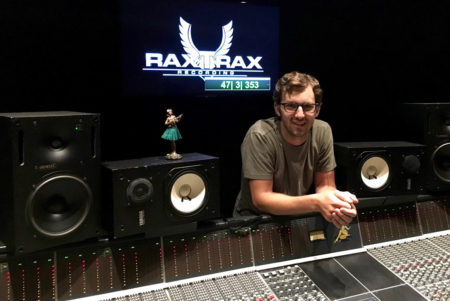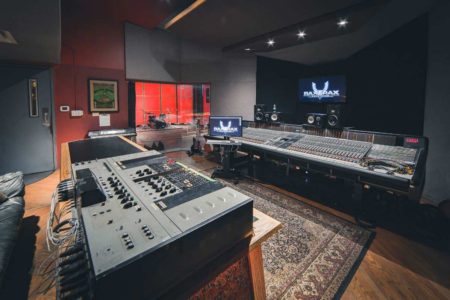Please fill out the following information, and RRFC Admissions will contact you to discuss our program offerings:
Issue #167 – Mentor News
by L. Swift and Jeff McQ
 ON HIS APPROACH TO THE USE OF ANALOG VERSUS DIGITAL IN THE RECORDING STUDIO:
“My approach in terms of mixing is to utilize whatever tools I have, whether they’re analog or digital, as a means to an end. I’m trying to find what is going to most efficiently get me to my goal… Sometimes on a particular project, I know that it will require a lot of work in pieces, lots of separate sessions. In that case, to do a heavy analog production is going to be a lot of extra work that I’m going to spend documenting and recalling and documenting and recalling. That doesn’t necessarily serve the project well because it takes up a bunch of extra time. On the other hand, I know that there are times when people will perceive an advantage to one method over another. In that case I’m going to try to utilize whatever will put them more at ease or may be more comfortable for them if they want to engage in it.
In terms of the approach to mixing, unless you’re coming from tape to console to tape again, everything is going to have some sort of hybrid of digital in there. There’s a whole spectrum, so whether you go basically fully digital and you’re mixing in the box, or you have something that is heavy analog where you’re utilizing plug-ins but you’re spreading the mix out on the console and using a lot of outboard gear, or something in between such as using analog summing and hardware inserts, you’ve got to weigh what’s going to help you get the sound you’re looking for most effectively. I think that’s important to weigh so that I can be flexible and so I’m not just entirely bringing my own bias to it. Obviously, as a mix engineer, you’re going to have preferences about workflow and preferences about how something’s going to sound. Hopefully that’s why someone’s coming to you.”
ON HAVING DIFFERENT MIXING APPROACHES WITH DIFFERENT PROJECTS, OR CHANGING METHODS ON A PROJECT:
“There have been times where I’ve worked on projects where I thought for sure this is going to be an Option A mix, and I started it and felt, ‘This isn’t actually giving me what I want. I’m going to adjust to a different method.’ Sometimes the method or piece of gear we think will be the right one isn’t the right option and we need to be able to change gears in order to correct the path. I think that sometimes people who are a little bit on the outside tend to idealize certain processes as if that in itself is the thing. This tends to happen a little bit more with analog because there’s a mystique to it and marketing certainly plays into that pretty heavily. I think sometimes people will look at that process as if that is going to achieve something for them in and of itself. It may, but that’s just a piece of the puzzle. Sometimes people ignore the things that are actually more important, and they get hung up on using microphone A, B, or C or mixing console A, B, or C. Those absolutely play a factor, but they’re not going to trump the performance or the arrangement or songwriting. The tools you use can help inspire a better performance but they’re not automatically going to make something better just by using them.”
ADVICE ON BEING PROACTIVE WITH DECISIONS DURING THE RECORDING PROCESS, AS OPPOSED TO WAITING UNTIL POST:
“While you’re recording, you should always be trying to get as close to the sound you want as an end result. You should be making decisions… I worked with an artist just a couple weeks ago that was going for a particular vocal sound, and so rather than doing it after the fact, I did it while he was recording. He wanted his voice to sound like the sound of an old blues harp playing through an amp, so I set up a system to create that sound. He ended up doing the whole thing in a single take because he was like, ‘Man, I was just enjoying what was coming into my headphones. I was just vibing off of that and having a good time singing this song.’ He was able to put himself into the right frame of mind, into the right mood, right from the get-go… So the approach, the technique, all of that on my end did help inspire him and his performance, but ultimately it is the performance and not the studio technique that makes the song.”
ON HIS APPROACH TO THE USE OF ANALOG VERSUS DIGITAL IN THE RECORDING STUDIO:
“My approach in terms of mixing is to utilize whatever tools I have, whether they’re analog or digital, as a means to an end. I’m trying to find what is going to most efficiently get me to my goal… Sometimes on a particular project, I know that it will require a lot of work in pieces, lots of separate sessions. In that case, to do a heavy analog production is going to be a lot of extra work that I’m going to spend documenting and recalling and documenting and recalling. That doesn’t necessarily serve the project well because it takes up a bunch of extra time. On the other hand, I know that there are times when people will perceive an advantage to one method over another. In that case I’m going to try to utilize whatever will put them more at ease or may be more comfortable for them if they want to engage in it.
In terms of the approach to mixing, unless you’re coming from tape to console to tape again, everything is going to have some sort of hybrid of digital in there. There’s a whole spectrum, so whether you go basically fully digital and you’re mixing in the box, or you have something that is heavy analog where you’re utilizing plug-ins but you’re spreading the mix out on the console and using a lot of outboard gear, or something in between such as using analog summing and hardware inserts, you’ve got to weigh what’s going to help you get the sound you’re looking for most effectively. I think that’s important to weigh so that I can be flexible and so I’m not just entirely bringing my own bias to it. Obviously, as a mix engineer, you’re going to have preferences about workflow and preferences about how something’s going to sound. Hopefully that’s why someone’s coming to you.”
ON HAVING DIFFERENT MIXING APPROACHES WITH DIFFERENT PROJECTS, OR CHANGING METHODS ON A PROJECT:
“There have been times where I’ve worked on projects where I thought for sure this is going to be an Option A mix, and I started it and felt, ‘This isn’t actually giving me what I want. I’m going to adjust to a different method.’ Sometimes the method or piece of gear we think will be the right one isn’t the right option and we need to be able to change gears in order to correct the path. I think that sometimes people who are a little bit on the outside tend to idealize certain processes as if that in itself is the thing. This tends to happen a little bit more with analog because there’s a mystique to it and marketing certainly plays into that pretty heavily. I think sometimes people will look at that process as if that is going to achieve something for them in and of itself. It may, but that’s just a piece of the puzzle. Sometimes people ignore the things that are actually more important, and they get hung up on using microphone A, B, or C or mixing console A, B, or C. Those absolutely play a factor, but they’re not going to trump the performance or the arrangement or songwriting. The tools you use can help inspire a better performance but they’re not automatically going to make something better just by using them.”
ADVICE ON BEING PROACTIVE WITH DECISIONS DURING THE RECORDING PROCESS, AS OPPOSED TO WAITING UNTIL POST:
“While you’re recording, you should always be trying to get as close to the sound you want as an end result. You should be making decisions… I worked with an artist just a couple weeks ago that was going for a particular vocal sound, and so rather than doing it after the fact, I did it while he was recording. He wanted his voice to sound like the sound of an old blues harp playing through an amp, so I set up a system to create that sound. He ended up doing the whole thing in a single take because he was like, ‘Man, I was just enjoying what was coming into my headphones. I was just vibing off of that and having a good time singing this song.’ He was able to put himself into the right frame of mind, into the right mood, right from the get-go… So the approach, the technique, all of that on my end did help inspire him and his performance, but ultimately it is the performance and not the studio technique that makes the song.”

Rax Trax Recording, Chicago, IL
or call (800) 755-7597

RRFC is education upgraded for the 21st century.
Get the latest career advice, insider production tips, and more!
Please fill out the following information, and RRFC Admissions will contact you to discuss our program offerings:
Stay in the Loop: Subscribe for RRFC news & updates!
© 2025 Recording Radio Film Connection & CASA Schools. All Rights Reserved.
